Analysis of Royal Commission Report and Freedom Insurance Case Study
VerifiedAdded on 2023/02/01
|12
|3182
|86
Report
AI Summary
This report provides an executive summary of the ethical principles essential to modern business organizations, particularly in light of the Australian Royal Commission's inquiries into the insurance, superannuation, and banking industries. It examines the commission's responses to ethical misconduct, evaluating them through the lens of deontological ethics, which emphasizes adherence to duties. A significant portion of the report is dedicated to a case study of Freedom Insurance, analyzing its sales and retention practices in relation to ethical principles and the APES 110 Code of Ethics for professional accountants. The report highlights the company's aggressive sales tactics and the ethical implications of these practices, particularly in the context of a customer with Down syndrome. The analysis includes an overview of the Royal Commission's recommendations, such as revisions to commission payment terms and the importance of mortgage brokers acting in the best interests of borrowers. Furthermore, the report underscores the responsibilities of senior accountants within Freedom Insurance, emphasizing the need for ethical conduct in all business functions, and the importance of objectivity, integrity, and professional behavior as outlined in the APES 110 code. The report concludes by synthesizing the findings and emphasizing the importance of ethical compliance and responsible corporate governance within the financial sector.
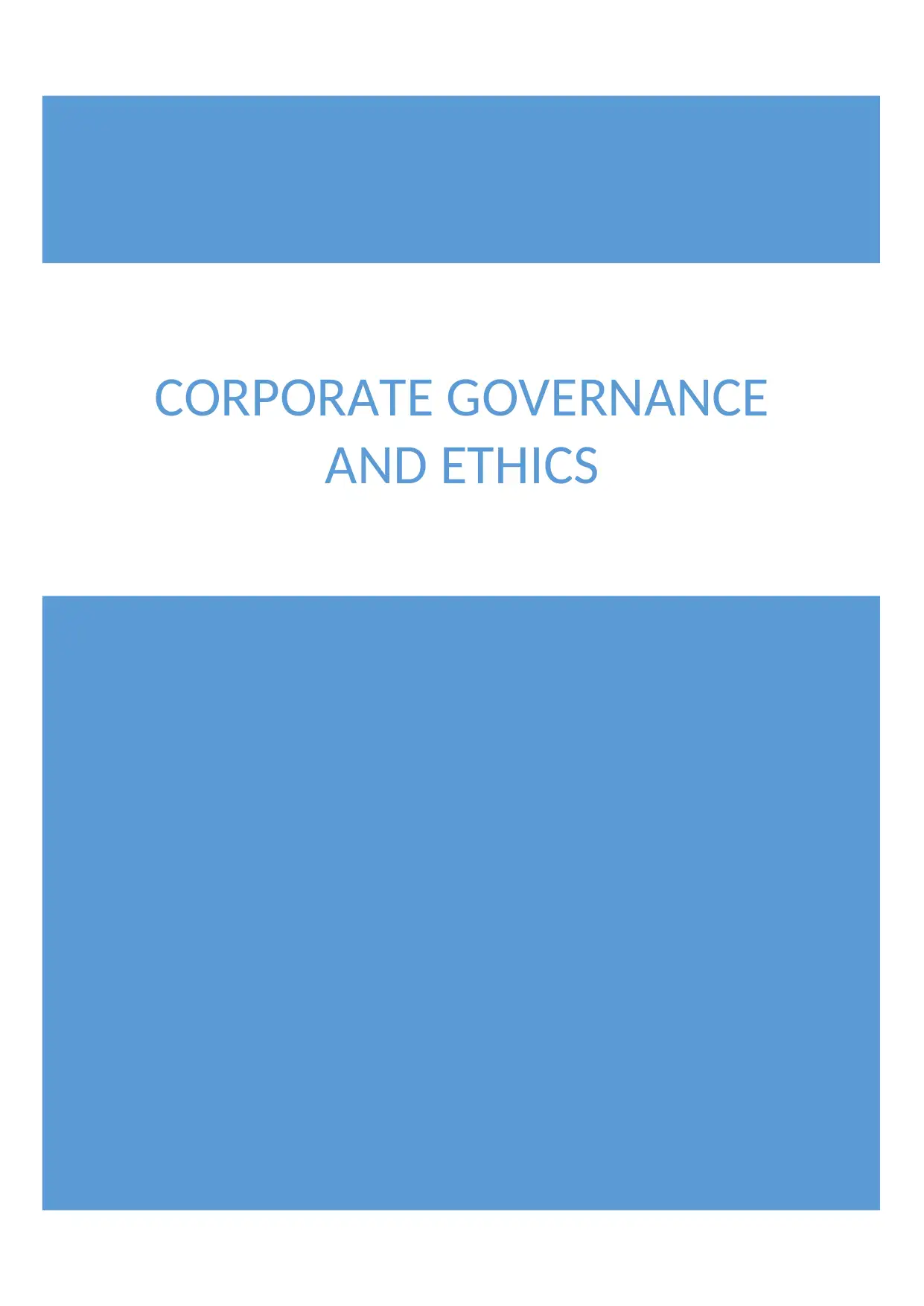
CORPORATE GOVERNANCE
AND ETHICS
AND ETHICS
Paraphrase This Document
Need a fresh take? Get an instant paraphrase of this document with our AI Paraphraser
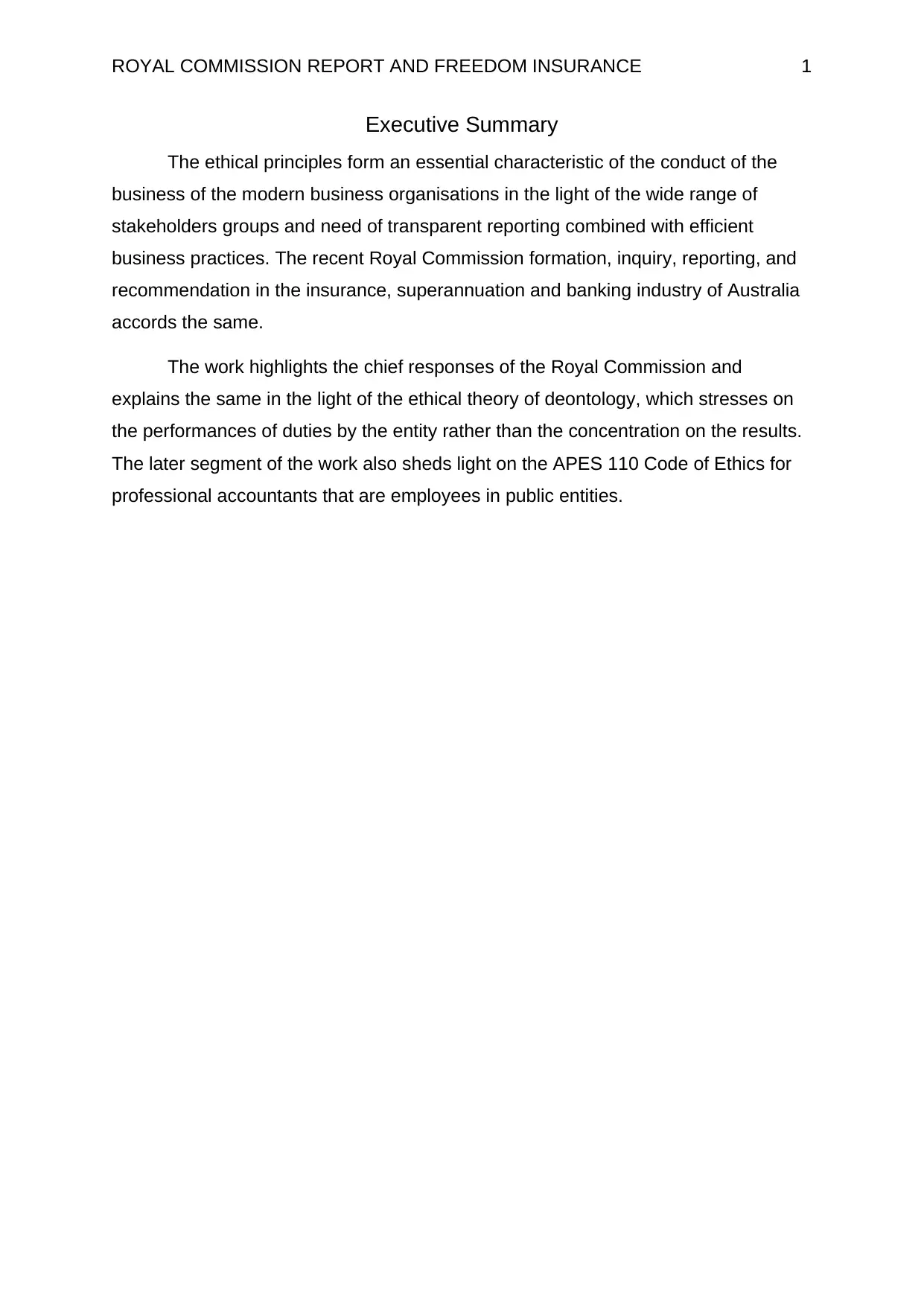
ROYAL COMMISSION REPORT AND FREEDOM INSURANCE 1
Executive Summary
The ethical principles form an essential characteristic of the conduct of the
business of the modern business organisations in the light of the wide range of
stakeholders groups and need of transparent reporting combined with efficient
business practices. The recent Royal Commission formation, inquiry, reporting, and
recommendation in the insurance, superannuation and banking industry of Australia
accords the same.
The work highlights the chief responses of the Royal Commission and
explains the same in the light of the ethical theory of deontology, which stresses on
the performances of duties by the entity rather than the concentration on the results.
The later segment of the work also sheds light on the APES 110 Code of Ethics for
professional accountants that are employees in public entities.
Executive Summary
The ethical principles form an essential characteristic of the conduct of the
business of the modern business organisations in the light of the wide range of
stakeholders groups and need of transparent reporting combined with efficient
business practices. The recent Royal Commission formation, inquiry, reporting, and
recommendation in the insurance, superannuation and banking industry of Australia
accords the same.
The work highlights the chief responses of the Royal Commission and
explains the same in the light of the ethical theory of deontology, which stresses on
the performances of duties by the entity rather than the concentration on the results.
The later segment of the work also sheds light on the APES 110 Code of Ethics for
professional accountants that are employees in public entities.
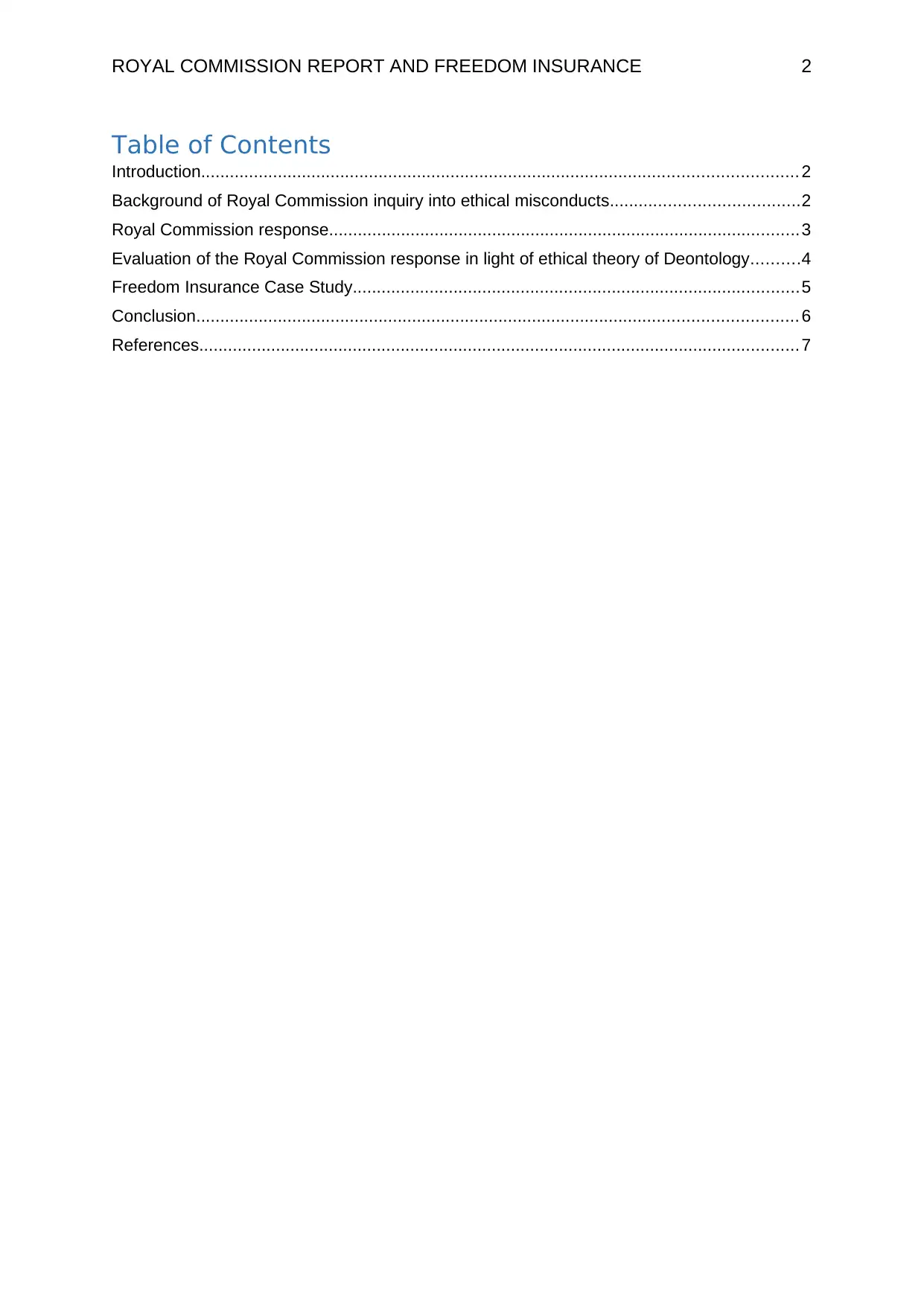
ROYAL COMMISSION REPORT AND FREEDOM INSURANCE 2
Table of Contents
Introduction............................................................................................................................ 2
Background of Royal Commission inquiry into ethical misconducts.......................................2
Royal Commission response..................................................................................................3
Evaluation of the Royal Commission response in light of ethical theory of Deontology..........4
Freedom Insurance Case Study.............................................................................................5
Conclusion............................................................................................................................. 6
References............................................................................................................................. 7
Table of Contents
Introduction............................................................................................................................ 2
Background of Royal Commission inquiry into ethical misconducts.......................................2
Royal Commission response..................................................................................................3
Evaluation of the Royal Commission response in light of ethical theory of Deontology..........4
Freedom Insurance Case Study.............................................................................................5
Conclusion............................................................................................................................. 6
References............................................................................................................................. 7
⊘ This is a preview!⊘
Do you want full access?
Subscribe today to unlock all pages.

Trusted by 1+ million students worldwide
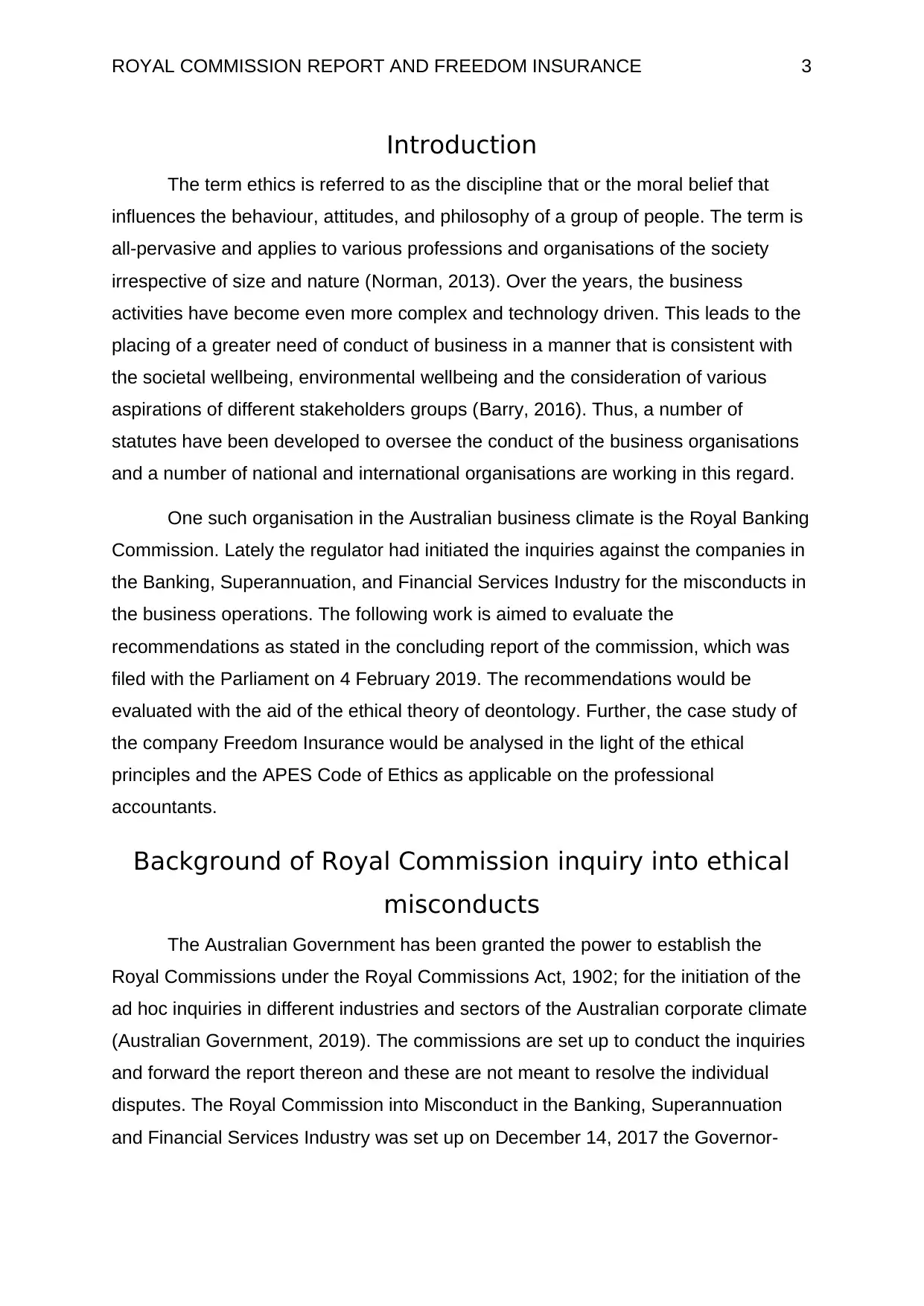
ROYAL COMMISSION REPORT AND FREEDOM INSURANCE 3
Introduction
The term ethics is referred to as the discipline that or the moral belief that
influences the behaviour, attitudes, and philosophy of a group of people. The term is
all-pervasive and applies to various professions and organisations of the society
irrespective of size and nature (Norman, 2013). Over the years, the business
activities have become even more complex and technology driven. This leads to the
placing of a greater need of conduct of business in a manner that is consistent with
the societal wellbeing, environmental wellbeing and the consideration of various
aspirations of different stakeholders groups (Barry, 2016). Thus, a number of
statutes have been developed to oversee the conduct of the business organisations
and a number of national and international organisations are working in this regard.
One such organisation in the Australian business climate is the Royal Banking
Commission. Lately the regulator had initiated the inquiries against the companies in
the Banking, Superannuation, and Financial Services Industry for the misconducts in
the business operations. The following work is aimed to evaluate the
recommendations as stated in the concluding report of the commission, which was
filed with the Parliament on 4 February 2019. The recommendations would be
evaluated with the aid of the ethical theory of deontology. Further, the case study of
the company Freedom Insurance would be analysed in the light of the ethical
principles and the APES Code of Ethics as applicable on the professional
accountants.
Background of Royal Commission inquiry into ethical
misconducts
The Australian Government has been granted the power to establish the
Royal Commissions under the Royal Commissions Act, 1902; for the initiation of the
ad hoc inquiries in different industries and sectors of the Australian corporate climate
(Australian Government, 2019). The commissions are set up to conduct the inquiries
and forward the report thereon and these are not meant to resolve the individual
disputes. The Royal Commission into Misconduct in the Banking, Superannuation
and Financial Services Industry was set up on December 14, 2017 the Governor-
Introduction
The term ethics is referred to as the discipline that or the moral belief that
influences the behaviour, attitudes, and philosophy of a group of people. The term is
all-pervasive and applies to various professions and organisations of the society
irrespective of size and nature (Norman, 2013). Over the years, the business
activities have become even more complex and technology driven. This leads to the
placing of a greater need of conduct of business in a manner that is consistent with
the societal wellbeing, environmental wellbeing and the consideration of various
aspirations of different stakeholders groups (Barry, 2016). Thus, a number of
statutes have been developed to oversee the conduct of the business organisations
and a number of national and international organisations are working in this regard.
One such organisation in the Australian business climate is the Royal Banking
Commission. Lately the regulator had initiated the inquiries against the companies in
the Banking, Superannuation, and Financial Services Industry for the misconducts in
the business operations. The following work is aimed to evaluate the
recommendations as stated in the concluding report of the commission, which was
filed with the Parliament on 4 February 2019. The recommendations would be
evaluated with the aid of the ethical theory of deontology. Further, the case study of
the company Freedom Insurance would be analysed in the light of the ethical
principles and the APES Code of Ethics as applicable on the professional
accountants.
Background of Royal Commission inquiry into ethical
misconducts
The Australian Government has been granted the power to establish the
Royal Commissions under the Royal Commissions Act, 1902; for the initiation of the
ad hoc inquiries in different industries and sectors of the Australian corporate climate
(Australian Government, 2019). The commissions are set up to conduct the inquiries
and forward the report thereon and these are not meant to resolve the individual
disputes. The Royal Commission into Misconduct in the Banking, Superannuation
and Financial Services Industry was set up on December 14, 2017 the Governor-
Paraphrase This Document
Need a fresh take? Get an instant paraphrase of this document with our AI Paraphraser
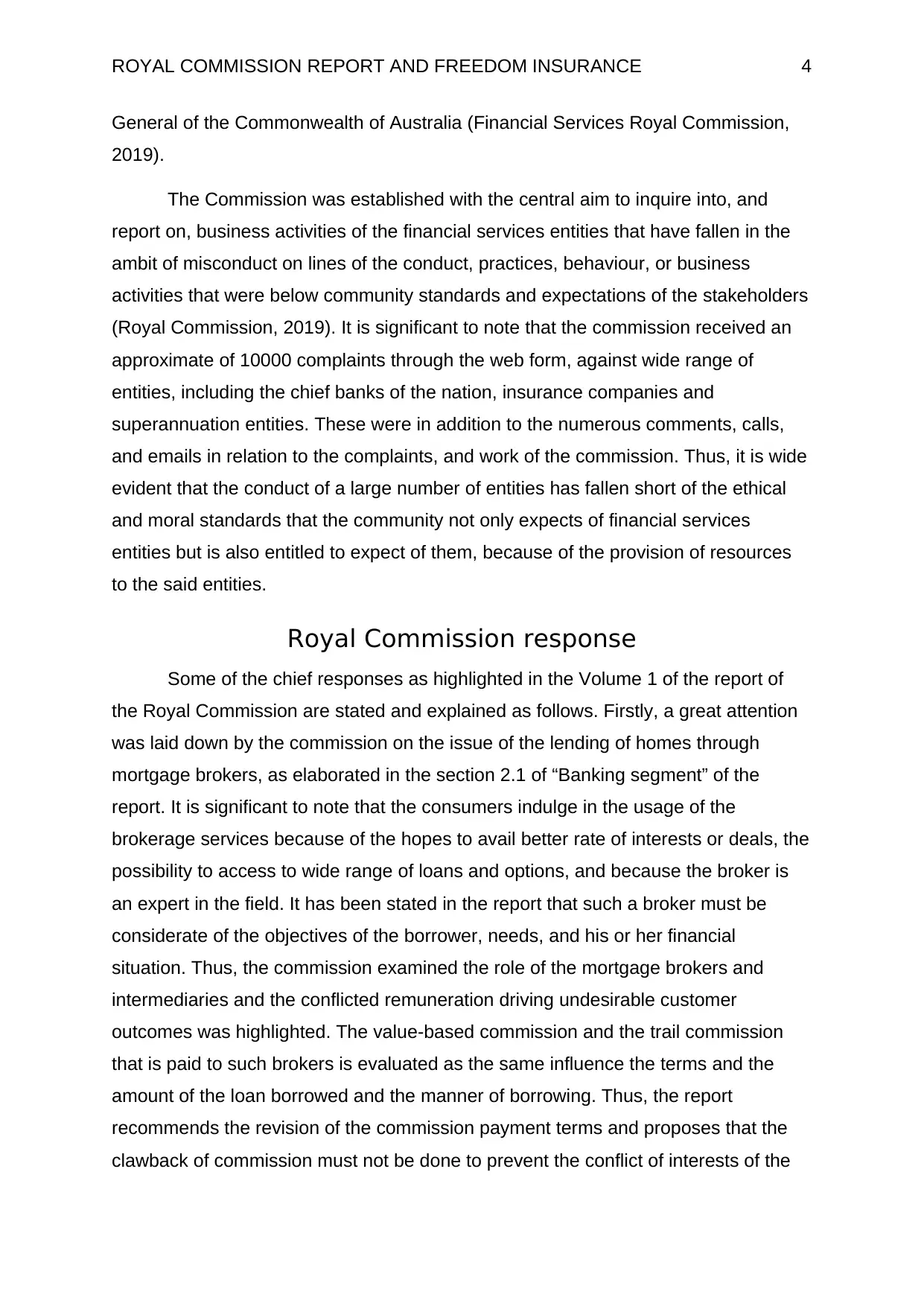
ROYAL COMMISSION REPORT AND FREEDOM INSURANCE 4
General of the Commonwealth of Australia (Financial Services Royal Commission,
2019).
The Commission was established with the central aim to inquire into, and
report on, business activities of the financial services entities that have fallen in the
ambit of misconduct on lines of the conduct, practices, behaviour, or business
activities that were below community standards and expectations of the stakeholders
(Royal Commission, 2019). It is significant to note that the commission received an
approximate of 10000 complaints through the web form, against wide range of
entities, including the chief banks of the nation, insurance companies and
superannuation entities. These were in addition to the numerous comments, calls,
and emails in relation to the complaints, and work of the commission. Thus, it is wide
evident that the conduct of a large number of entities has fallen short of the ethical
and moral standards that the community not only expects of financial services
entities but is also entitled to expect of them, because of the provision of resources
to the said entities.
Royal Commission response
Some of the chief responses as highlighted in the Volume 1 of the report of
the Royal Commission are stated and explained as follows. Firstly, a great attention
was laid down by the commission on the issue of the lending of homes through
mortgage brokers, as elaborated in the section 2.1 of “Banking segment” of the
report. It is significant to note that the consumers indulge in the usage of the
brokerage services because of the hopes to avail better rate of interests or deals, the
possibility to access to wide range of loans and options, and because the broker is
an expert in the field. It has been stated in the report that such a broker must be
considerate of the objectives of the borrower, needs, and his or her financial
situation. Thus, the commission examined the role of the mortgage brokers and
intermediaries and the conflicted remuneration driving undesirable customer
outcomes was highlighted. The value-based commission and the trail commission
that is paid to such brokers is evaluated as the same influence the terms and the
amount of the loan borrowed and the manner of borrowing. Thus, the report
recommends the revision of the commission payment terms and proposes that the
clawback of commission must not be done to prevent the conflict of interests of the
General of the Commonwealth of Australia (Financial Services Royal Commission,
2019).
The Commission was established with the central aim to inquire into, and
report on, business activities of the financial services entities that have fallen in the
ambit of misconduct on lines of the conduct, practices, behaviour, or business
activities that were below community standards and expectations of the stakeholders
(Royal Commission, 2019). It is significant to note that the commission received an
approximate of 10000 complaints through the web form, against wide range of
entities, including the chief banks of the nation, insurance companies and
superannuation entities. These were in addition to the numerous comments, calls,
and emails in relation to the complaints, and work of the commission. Thus, it is wide
evident that the conduct of a large number of entities has fallen short of the ethical
and moral standards that the community not only expects of financial services
entities but is also entitled to expect of them, because of the provision of resources
to the said entities.
Royal Commission response
Some of the chief responses as highlighted in the Volume 1 of the report of
the Royal Commission are stated and explained as follows. Firstly, a great attention
was laid down by the commission on the issue of the lending of homes through
mortgage brokers, as elaborated in the section 2.1 of “Banking segment” of the
report. It is significant to note that the consumers indulge in the usage of the
brokerage services because of the hopes to avail better rate of interests or deals, the
possibility to access to wide range of loans and options, and because the broker is
an expert in the field. It has been stated in the report that such a broker must be
considerate of the objectives of the borrower, needs, and his or her financial
situation. Thus, the commission examined the role of the mortgage brokers and
intermediaries and the conflicted remuneration driving undesirable customer
outcomes was highlighted. The value-based commission and the trail commission
that is paid to such brokers is evaluated as the same influence the terms and the
amount of the loan borrowed and the manner of borrowing. Thus, the report
recommends the revision of the commission payment terms and proposes that the
clawback of commission must not be done to prevent the conflict of interests of the
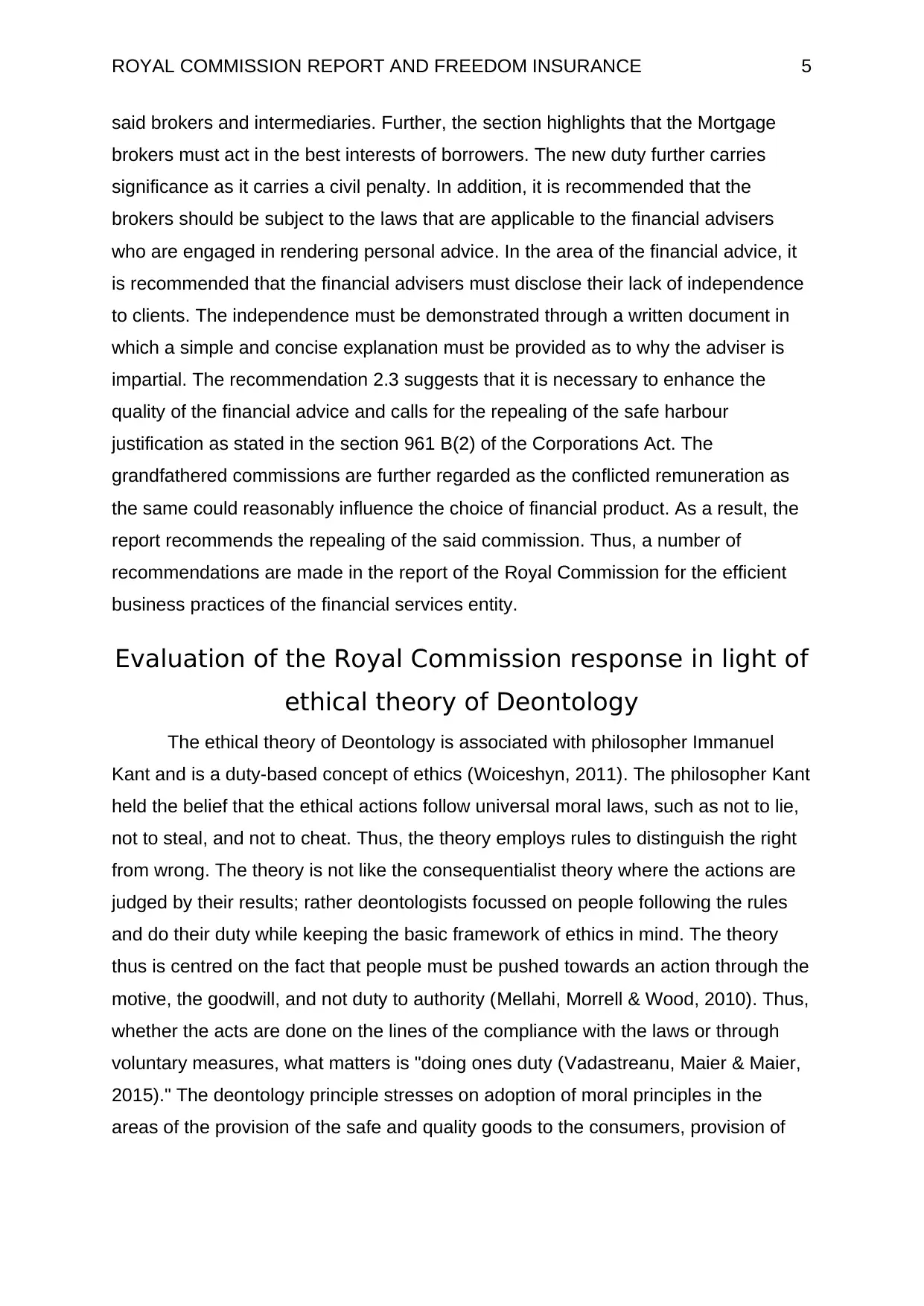
ROYAL COMMISSION REPORT AND FREEDOM INSURANCE 5
said brokers and intermediaries. Further, the section highlights that the Mortgage
brokers must act in the best interests of borrowers. The new duty further carries
significance as it carries a civil penalty. In addition, it is recommended that the
brokers should be subject to the laws that are applicable to the financial advisers
who are engaged in rendering personal advice. In the area of the financial advice, it
is recommended that the financial advisers must disclose their lack of independence
to clients. The independence must be demonstrated through a written document in
which a simple and concise explanation must be provided as to why the adviser is
impartial. The recommendation 2.3 suggests that it is necessary to enhance the
quality of the financial advice and calls for the repealing of the safe harbour
justification as stated in the section 961 B(2) of the Corporations Act. The
grandfathered commissions are further regarded as the conflicted remuneration as
the same could reasonably influence the choice of financial product. As a result, the
report recommends the repealing of the said commission. Thus, a number of
recommendations are made in the report of the Royal Commission for the efficient
business practices of the financial services entity.
Evaluation of the Royal Commission response in light of
ethical theory of Deontology
The ethical theory of Deontology is associated with philosopher Immanuel
Kant and is a duty-based concept of ethics (Woiceshyn, 2011). The philosopher Kant
held the belief that the ethical actions follow universal moral laws, such as not to lie,
not to steal, and not to cheat. Thus, the theory employs rules to distinguish the right
from wrong. The theory is not like the consequentialist theory where the actions are
judged by their results; rather deontologists focussed on people following the rules
and do their duty while keeping the basic framework of ethics in mind. The theory
thus is centred on the fact that people must be pushed towards an action through the
motive, the goodwill, and not duty to authority (Mellahi, Morrell & Wood, 2010). Thus,
whether the acts are done on the lines of the compliance with the laws or through
voluntary measures, what matters is "doing ones duty (Vadastreanu, Maier & Maier,
2015)." The deontology principle stresses on adoption of moral principles in the
areas of the provision of the safe and quality goods to the consumers, provision of
said brokers and intermediaries. Further, the section highlights that the Mortgage
brokers must act in the best interests of borrowers. The new duty further carries
significance as it carries a civil penalty. In addition, it is recommended that the
brokers should be subject to the laws that are applicable to the financial advisers
who are engaged in rendering personal advice. In the area of the financial advice, it
is recommended that the financial advisers must disclose their lack of independence
to clients. The independence must be demonstrated through a written document in
which a simple and concise explanation must be provided as to why the adviser is
impartial. The recommendation 2.3 suggests that it is necessary to enhance the
quality of the financial advice and calls for the repealing of the safe harbour
justification as stated in the section 961 B(2) of the Corporations Act. The
grandfathered commissions are further regarded as the conflicted remuneration as
the same could reasonably influence the choice of financial product. As a result, the
report recommends the repealing of the said commission. Thus, a number of
recommendations are made in the report of the Royal Commission for the efficient
business practices of the financial services entity.
Evaluation of the Royal Commission response in light of
ethical theory of Deontology
The ethical theory of Deontology is associated with philosopher Immanuel
Kant and is a duty-based concept of ethics (Woiceshyn, 2011). The philosopher Kant
held the belief that the ethical actions follow universal moral laws, such as not to lie,
not to steal, and not to cheat. Thus, the theory employs rules to distinguish the right
from wrong. The theory is not like the consequentialist theory where the actions are
judged by their results; rather deontologists focussed on people following the rules
and do their duty while keeping the basic framework of ethics in mind. The theory
thus is centred on the fact that people must be pushed towards an action through the
motive, the goodwill, and not duty to authority (Mellahi, Morrell & Wood, 2010). Thus,
whether the acts are done on the lines of the compliance with the laws or through
voluntary measures, what matters is "doing ones duty (Vadastreanu, Maier & Maier,
2015)." The deontology principle stresses on adoption of moral principles in the
areas of the provision of the safe and quality goods to the consumers, provision of
⊘ This is a preview!⊘
Do you want full access?
Subscribe today to unlock all pages.

Trusted by 1+ million students worldwide
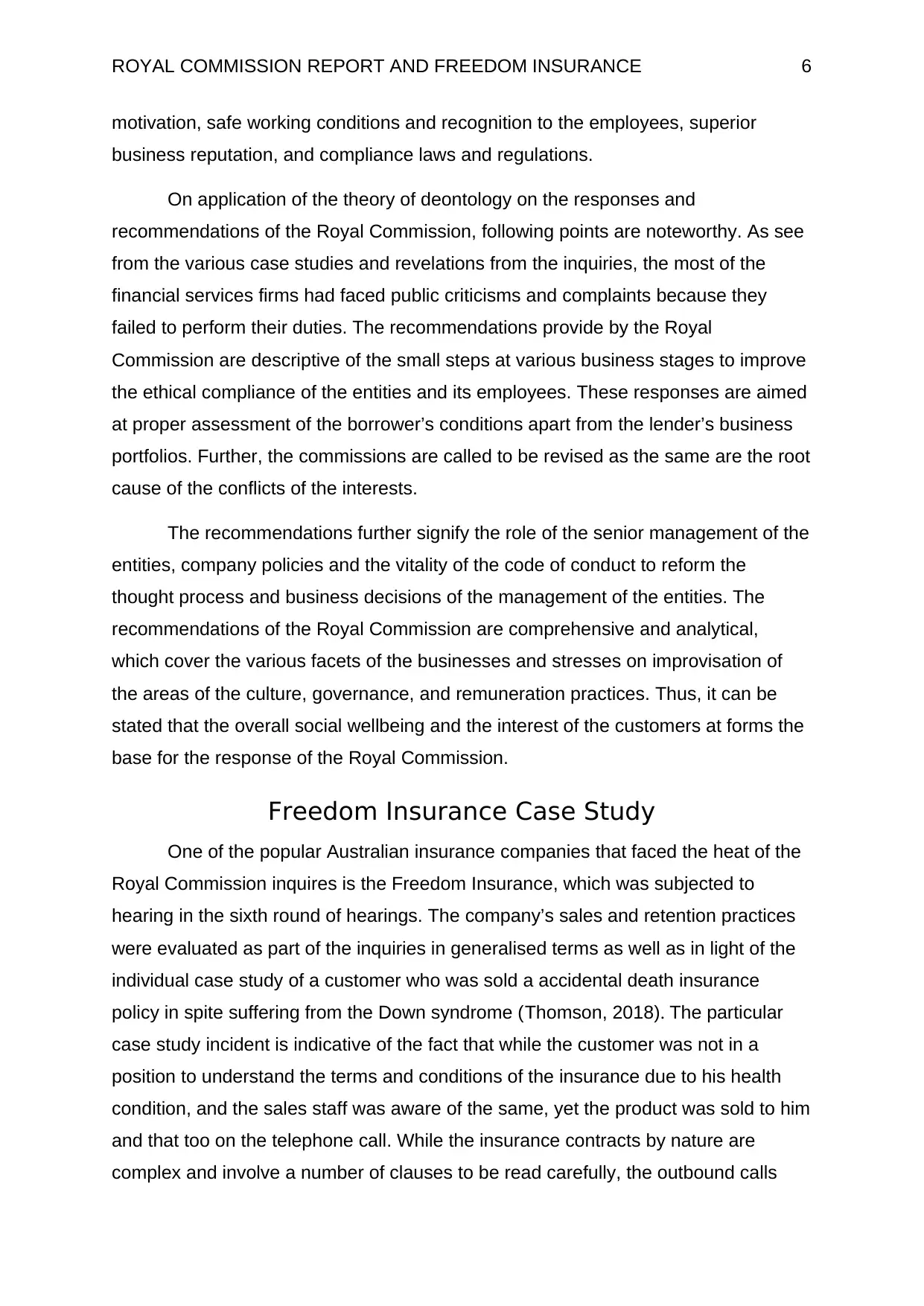
ROYAL COMMISSION REPORT AND FREEDOM INSURANCE 6
motivation, safe working conditions and recognition to the employees, superior
business reputation, and compliance laws and regulations.
On application of the theory of deontology on the responses and
recommendations of the Royal Commission, following points are noteworthy. As see
from the various case studies and revelations from the inquiries, the most of the
financial services firms had faced public criticisms and complaints because they
failed to perform their duties. The recommendations provide by the Royal
Commission are descriptive of the small steps at various business stages to improve
the ethical compliance of the entities and its employees. These responses are aimed
at proper assessment of the borrower’s conditions apart from the lender’s business
portfolios. Further, the commissions are called to be revised as the same are the root
cause of the conflicts of the interests.
The recommendations further signify the role of the senior management of the
entities, company policies and the vitality of the code of conduct to reform the
thought process and business decisions of the management of the entities. The
recommendations of the Royal Commission are comprehensive and analytical,
which cover the various facets of the businesses and stresses on improvisation of
the areas of the culture, governance, and remuneration practices. Thus, it can be
stated that the overall social wellbeing and the interest of the customers at forms the
base for the response of the Royal Commission.
Freedom Insurance Case Study
One of the popular Australian insurance companies that faced the heat of the
Royal Commission inquires is the Freedom Insurance, which was subjected to
hearing in the sixth round of hearings. The company’s sales and retention practices
were evaluated as part of the inquiries in generalised terms as well as in light of the
individual case study of a customer who was sold a accidental death insurance
policy in spite suffering from the Down syndrome (Thomson, 2018). The particular
case study incident is indicative of the fact that while the customer was not in a
position to understand the terms and conditions of the insurance due to his health
condition, and the sales staff was aware of the same, yet the product was sold to him
and that too on the telephone call. While the insurance contracts by nature are
complex and involve a number of clauses to be read carefully, the outbound calls
motivation, safe working conditions and recognition to the employees, superior
business reputation, and compliance laws and regulations.
On application of the theory of deontology on the responses and
recommendations of the Royal Commission, following points are noteworthy. As see
from the various case studies and revelations from the inquiries, the most of the
financial services firms had faced public criticisms and complaints because they
failed to perform their duties. The recommendations provide by the Royal
Commission are descriptive of the small steps at various business stages to improve
the ethical compliance of the entities and its employees. These responses are aimed
at proper assessment of the borrower’s conditions apart from the lender’s business
portfolios. Further, the commissions are called to be revised as the same are the root
cause of the conflicts of the interests.
The recommendations further signify the role of the senior management of the
entities, company policies and the vitality of the code of conduct to reform the
thought process and business decisions of the management of the entities. The
recommendations of the Royal Commission are comprehensive and analytical,
which cover the various facets of the businesses and stresses on improvisation of
the areas of the culture, governance, and remuneration practices. Thus, it can be
stated that the overall social wellbeing and the interest of the customers at forms the
base for the response of the Royal Commission.
Freedom Insurance Case Study
One of the popular Australian insurance companies that faced the heat of the
Royal Commission inquires is the Freedom Insurance, which was subjected to
hearing in the sixth round of hearings. The company’s sales and retention practices
were evaluated as part of the inquiries in generalised terms as well as in light of the
individual case study of a customer who was sold a accidental death insurance
policy in spite suffering from the Down syndrome (Thomson, 2018). The particular
case study incident is indicative of the fact that while the customer was not in a
position to understand the terms and conditions of the insurance due to his health
condition, and the sales staff was aware of the same, yet the product was sold to him
and that too on the telephone call. While the insurance contracts by nature are
complex and involve a number of clauses to be read carefully, the outbound calls
Paraphrase This Document
Need a fresh take? Get an instant paraphrase of this document with our AI Paraphraser
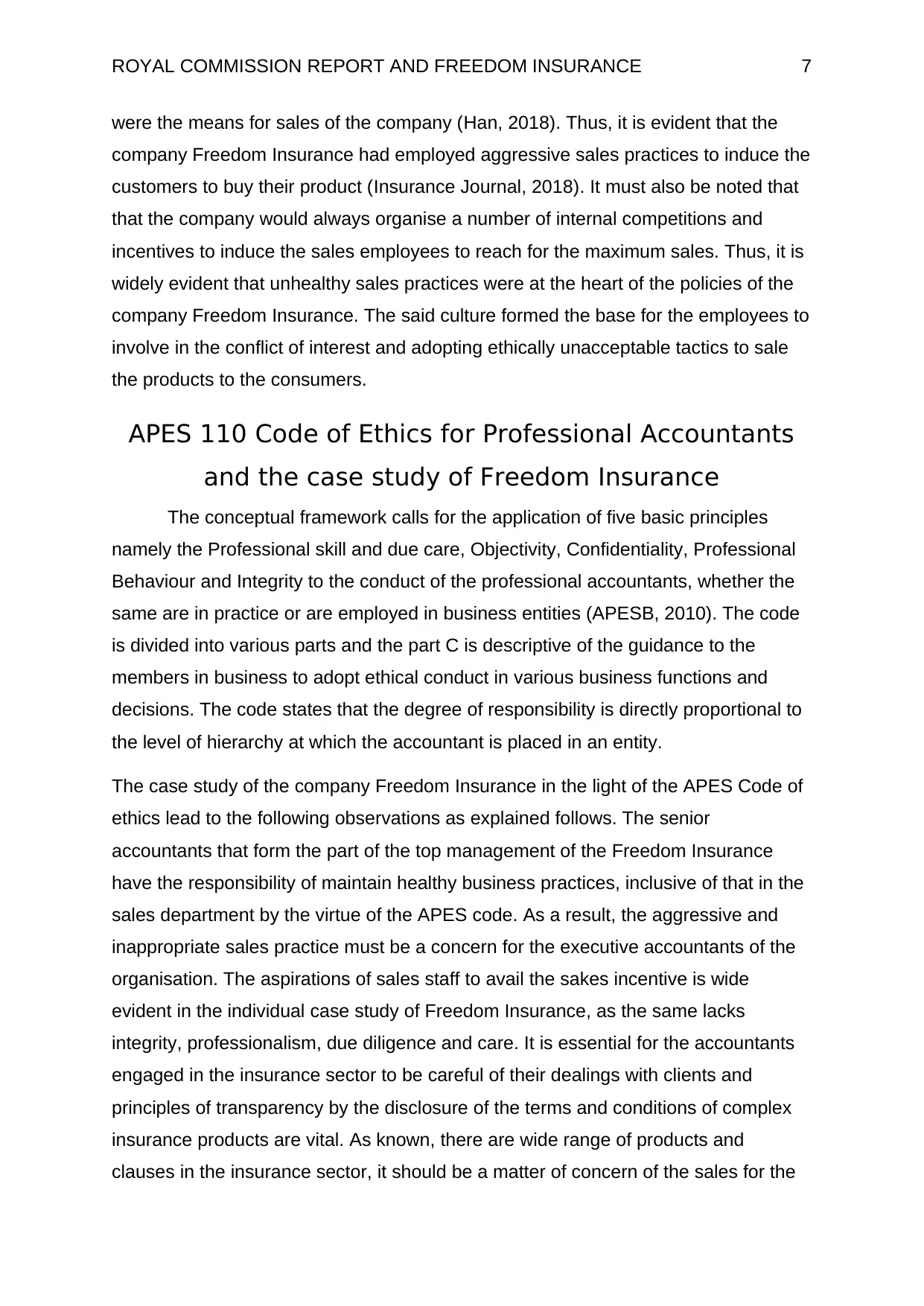
ROYAL COMMISSION REPORT AND FREEDOM INSURANCE 7
were the means for sales of the company (Han, 2018). Thus, it is evident that the
company Freedom Insurance had employed aggressive sales practices to induce the
customers to buy their product (Insurance Journal, 2018). It must also be noted that
that the company would always organise a number of internal competitions and
incentives to induce the sales employees to reach for the maximum sales. Thus, it is
widely evident that unhealthy sales practices were at the heart of the policies of the
company Freedom Insurance. The said culture formed the base for the employees to
involve in the conflict of interest and adopting ethically unacceptable tactics to sale
the products to the consumers.
APES 110 Code of Ethics for Professional Accountants
and the case study of Freedom Insurance
The conceptual framework calls for the application of five basic principles
namely the Professional skill and due care, Objectivity, Confidentiality, Professional
Behaviour and Integrity to the conduct of the professional accountants, whether the
same are in practice or are employed in business entities (APESB, 2010). The code
is divided into various parts and the part C is descriptive of the guidance to the
members in business to adopt ethical conduct in various business functions and
decisions. The code states that the degree of responsibility is directly proportional to
the level of hierarchy at which the accountant is placed in an entity.
The case study of the company Freedom Insurance in the light of the APES Code of
ethics lead to the following observations as explained follows. The senior
accountants that form the part of the top management of the Freedom Insurance
have the responsibility of maintain healthy business practices, inclusive of that in the
sales department by the virtue of the APES code. As a result, the aggressive and
inappropriate sales practice must be a concern for the executive accountants of the
organisation. The aspirations of sales staff to avail the sakes incentive is wide
evident in the individual case study of Freedom Insurance, as the same lacks
integrity, professionalism, due diligence and care. It is essential for the accountants
engaged in the insurance sector to be careful of their dealings with clients and
principles of transparency by the disclosure of the terms and conditions of complex
insurance products are vital. As known, there are wide range of products and
clauses in the insurance sector, it should be a matter of concern of the sales for the
were the means for sales of the company (Han, 2018). Thus, it is evident that the
company Freedom Insurance had employed aggressive sales practices to induce the
customers to buy their product (Insurance Journal, 2018). It must also be noted that
that the company would always organise a number of internal competitions and
incentives to induce the sales employees to reach for the maximum sales. Thus, it is
widely evident that unhealthy sales practices were at the heart of the policies of the
company Freedom Insurance. The said culture formed the base for the employees to
involve in the conflict of interest and adopting ethically unacceptable tactics to sale
the products to the consumers.
APES 110 Code of Ethics for Professional Accountants
and the case study of Freedom Insurance
The conceptual framework calls for the application of five basic principles
namely the Professional skill and due care, Objectivity, Confidentiality, Professional
Behaviour and Integrity to the conduct of the professional accountants, whether the
same are in practice or are employed in business entities (APESB, 2010). The code
is divided into various parts and the part C is descriptive of the guidance to the
members in business to adopt ethical conduct in various business functions and
decisions. The code states that the degree of responsibility is directly proportional to
the level of hierarchy at which the accountant is placed in an entity.
The case study of the company Freedom Insurance in the light of the APES Code of
ethics lead to the following observations as explained follows. The senior
accountants that form the part of the top management of the Freedom Insurance
have the responsibility of maintain healthy business practices, inclusive of that in the
sales department by the virtue of the APES code. As a result, the aggressive and
inappropriate sales practice must be a concern for the executive accountants of the
organisation. The aspirations of sales staff to avail the sakes incentive is wide
evident in the individual case study of Freedom Insurance, as the same lacks
integrity, professionalism, due diligence and care. It is essential for the accountants
engaged in the insurance sector to be careful of their dealings with clients and
principles of transparency by the disclosure of the terms and conditions of complex
insurance products are vital. As known, there are wide range of products and
clauses in the insurance sector, it should be a matter of concern of the sales for the
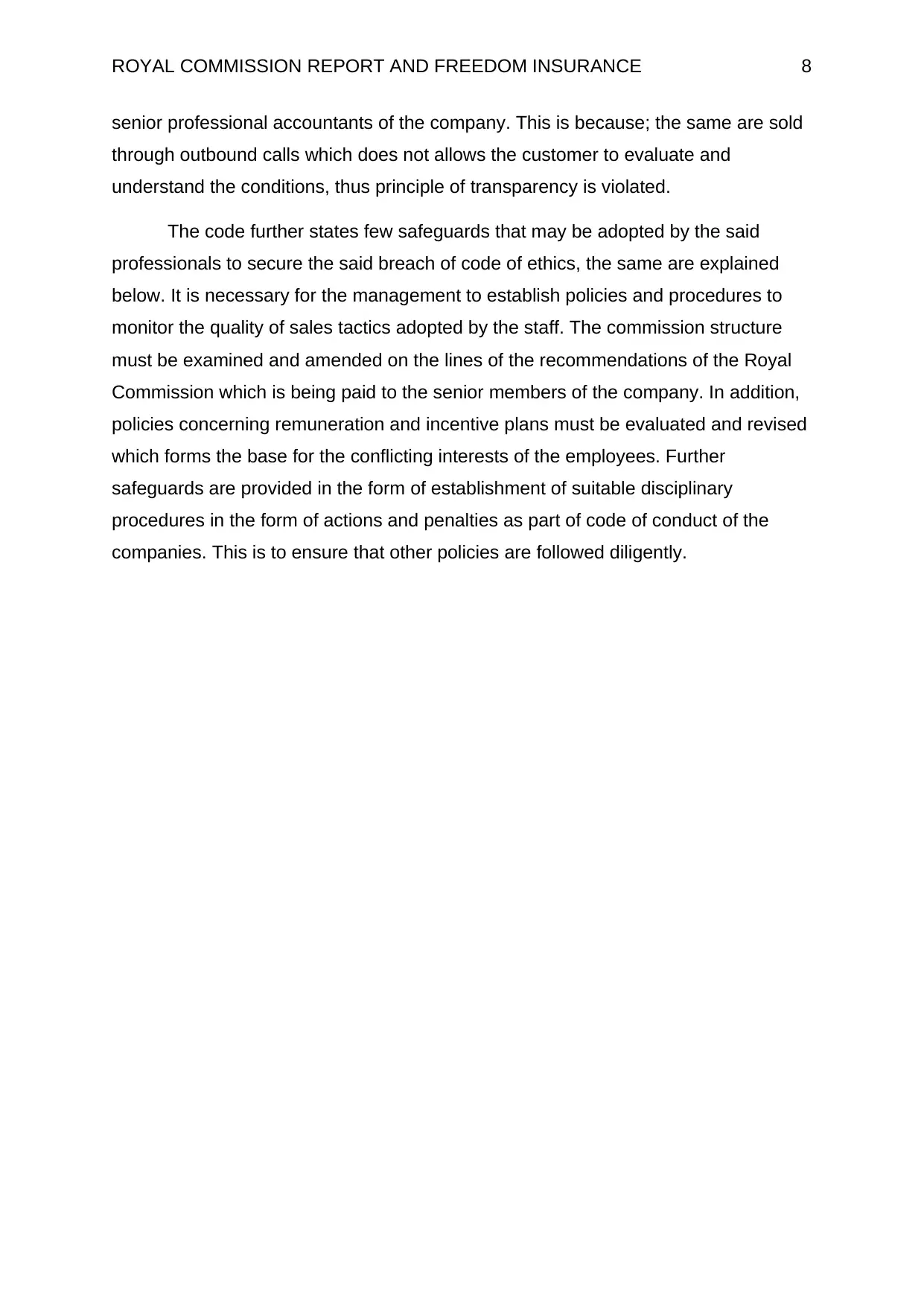
ROYAL COMMISSION REPORT AND FREEDOM INSURANCE 8
senior professional accountants of the company. This is because; the same are sold
through outbound calls which does not allows the customer to evaluate and
understand the conditions, thus principle of transparency is violated.
The code further states few safeguards that may be adopted by the said
professionals to secure the said breach of code of ethics, the same are explained
below. It is necessary for the management to establish policies and procedures to
monitor the quality of sales tactics adopted by the staff. The commission structure
must be examined and amended on the lines of the recommendations of the Royal
Commission which is being paid to the senior members of the company. In addition,
policies concerning remuneration and incentive plans must be evaluated and revised
which forms the base for the conflicting interests of the employees. Further
safeguards are provided in the form of establishment of suitable disciplinary
procedures in the form of actions and penalties as part of code of conduct of the
companies. This is to ensure that other policies are followed diligently.
senior professional accountants of the company. This is because; the same are sold
through outbound calls which does not allows the customer to evaluate and
understand the conditions, thus principle of transparency is violated.
The code further states few safeguards that may be adopted by the said
professionals to secure the said breach of code of ethics, the same are explained
below. It is necessary for the management to establish policies and procedures to
monitor the quality of sales tactics adopted by the staff. The commission structure
must be examined and amended on the lines of the recommendations of the Royal
Commission which is being paid to the senior members of the company. In addition,
policies concerning remuneration and incentive plans must be evaluated and revised
which forms the base for the conflicting interests of the employees. Further
safeguards are provided in the form of establishment of suitable disciplinary
procedures in the form of actions and penalties as part of code of conduct of the
companies. This is to ensure that other policies are followed diligently.
⊘ This is a preview!⊘
Do you want full access?
Subscribe today to unlock all pages.

Trusted by 1+ million students worldwide
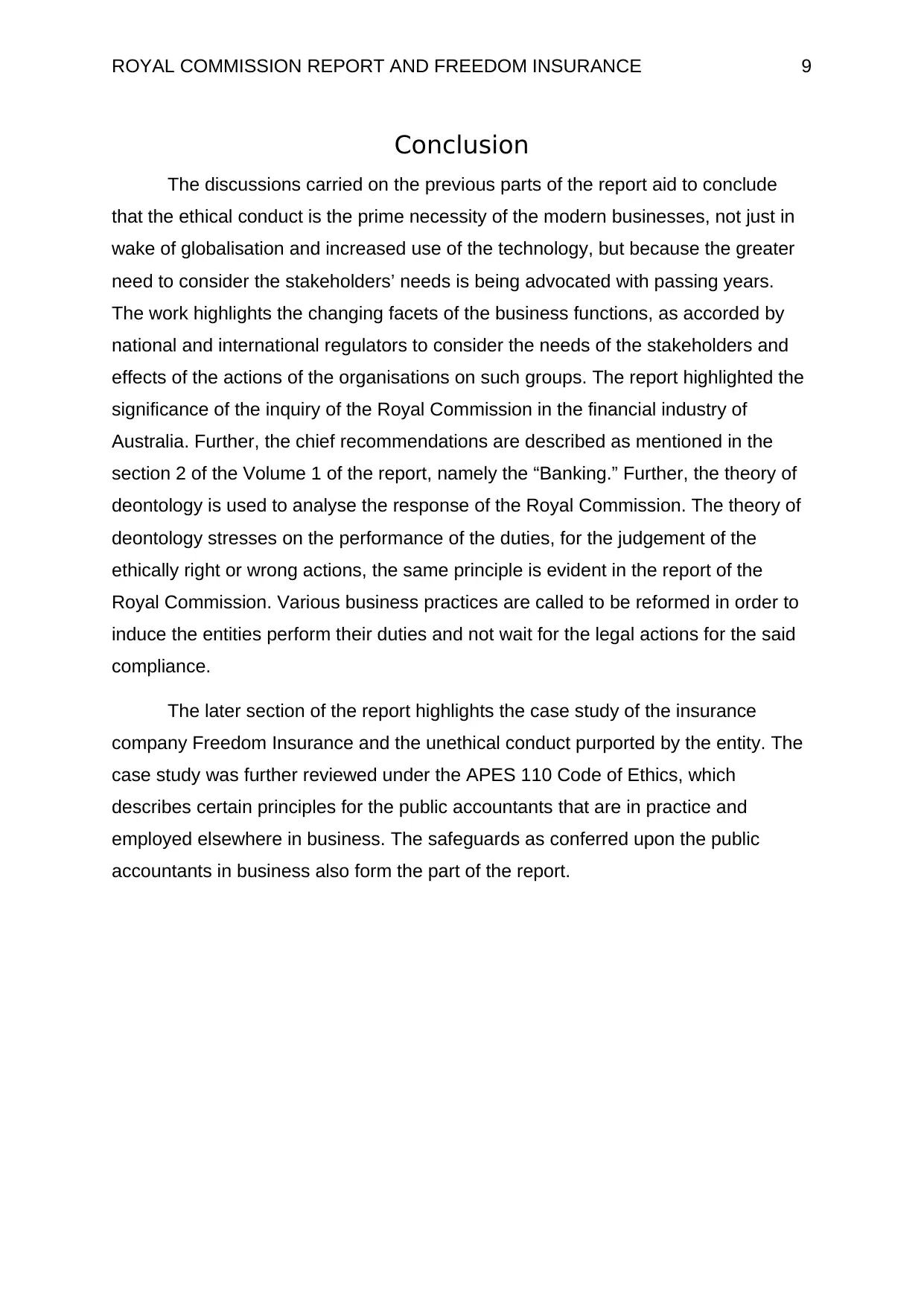
ROYAL COMMISSION REPORT AND FREEDOM INSURANCE 9
Conclusion
The discussions carried on the previous parts of the report aid to conclude
that the ethical conduct is the prime necessity of the modern businesses, not just in
wake of globalisation and increased use of the technology, but because the greater
need to consider the stakeholders’ needs is being advocated with passing years.
The work highlights the changing facets of the business functions, as accorded by
national and international regulators to consider the needs of the stakeholders and
effects of the actions of the organisations on such groups. The report highlighted the
significance of the inquiry of the Royal Commission in the financial industry of
Australia. Further, the chief recommendations are described as mentioned in the
section 2 of the Volume 1 of the report, namely the “Banking.” Further, the theory of
deontology is used to analyse the response of the Royal Commission. The theory of
deontology stresses on the performance of the duties, for the judgement of the
ethically right or wrong actions, the same principle is evident in the report of the
Royal Commission. Various business practices are called to be reformed in order to
induce the entities perform their duties and not wait for the legal actions for the said
compliance.
The later section of the report highlights the case study of the insurance
company Freedom Insurance and the unethical conduct purported by the entity. The
case study was further reviewed under the APES 110 Code of Ethics, which
describes certain principles for the public accountants that are in practice and
employed elsewhere in business. The safeguards as conferred upon the public
accountants in business also form the part of the report.
Conclusion
The discussions carried on the previous parts of the report aid to conclude
that the ethical conduct is the prime necessity of the modern businesses, not just in
wake of globalisation and increased use of the technology, but because the greater
need to consider the stakeholders’ needs is being advocated with passing years.
The work highlights the changing facets of the business functions, as accorded by
national and international regulators to consider the needs of the stakeholders and
effects of the actions of the organisations on such groups. The report highlighted the
significance of the inquiry of the Royal Commission in the financial industry of
Australia. Further, the chief recommendations are described as mentioned in the
section 2 of the Volume 1 of the report, namely the “Banking.” Further, the theory of
deontology is used to analyse the response of the Royal Commission. The theory of
deontology stresses on the performance of the duties, for the judgement of the
ethically right or wrong actions, the same principle is evident in the report of the
Royal Commission. Various business practices are called to be reformed in order to
induce the entities perform their duties and not wait for the legal actions for the said
compliance.
The later section of the report highlights the case study of the insurance
company Freedom Insurance and the unethical conduct purported by the entity. The
case study was further reviewed under the APES 110 Code of Ethics, which
describes certain principles for the public accountants that are in practice and
employed elsewhere in business. The safeguards as conferred upon the public
accountants in business also form the part of the report.
Paraphrase This Document
Need a fresh take? Get an instant paraphrase of this document with our AI Paraphraser
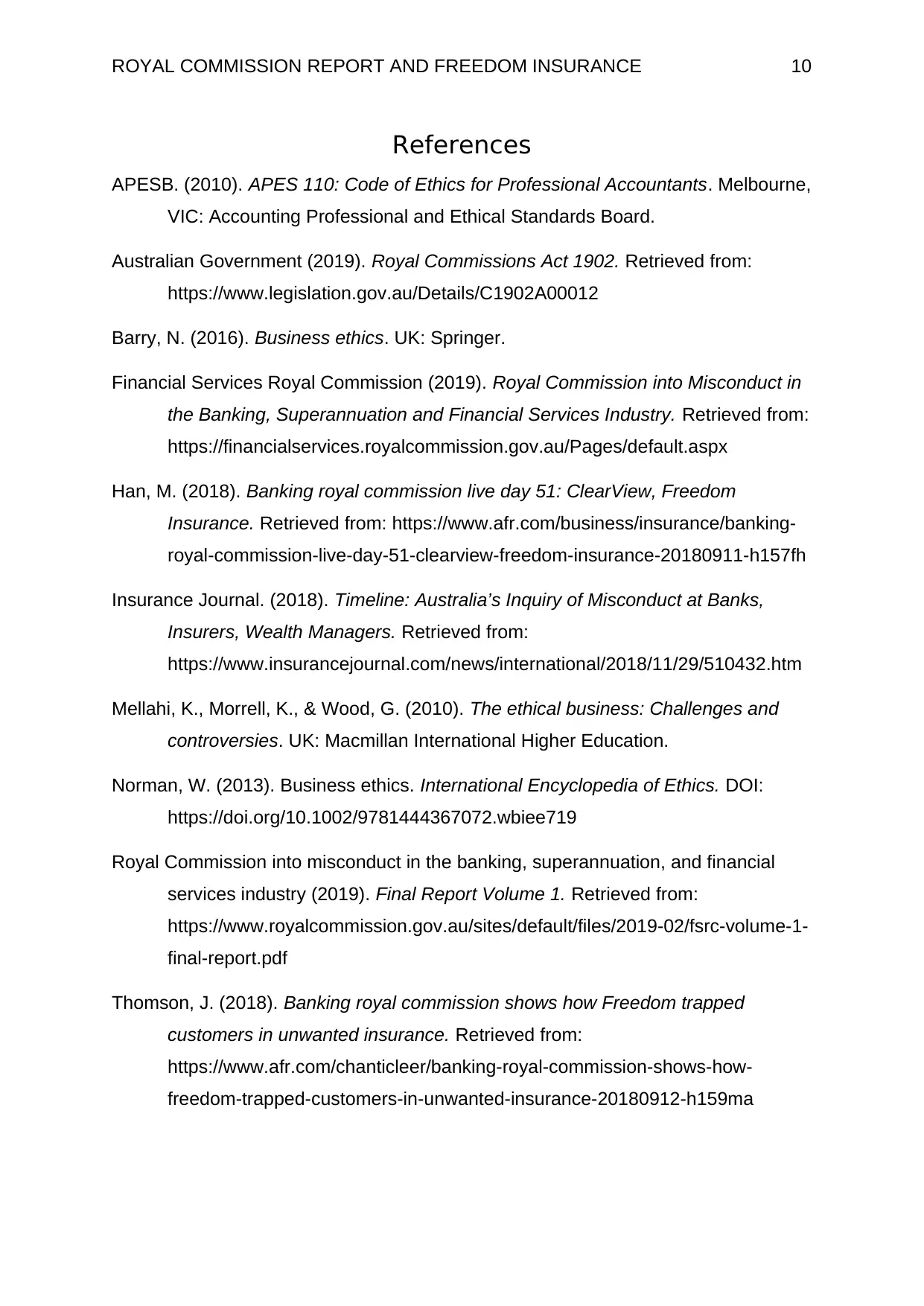
ROYAL COMMISSION REPORT AND FREEDOM INSURANCE 10
References
APESB. (2010). APES 110: Code of Ethics for Professional Accountants. Melbourne,
VIC: Accounting Professional and Ethical Standards Board.
Australian Government (2019). Royal Commissions Act 1902. Retrieved from:
https://www.legislation.gov.au/Details/C1902A00012
Barry, N. (2016). Business ethics. UK: Springer.
Financial Services Royal Commission (2019). Royal Commission into Misconduct in
the Banking, Superannuation and Financial Services Industry. Retrieved from:
https://financialservices.royalcommission.gov.au/Pages/default.aspx
Han, M. (2018). Banking royal commission live day 51: ClearView, Freedom
Insurance. Retrieved from: https://www.afr.com/business/insurance/banking-
royal-commission-live-day-51-clearview-freedom-insurance-20180911-h157fh
Insurance Journal. (2018). Timeline: Australia’s Inquiry of Misconduct at Banks,
Insurers, Wealth Managers. Retrieved from:
https://www.insurancejournal.com/news/international/2018/11/29/510432.htm
Mellahi, K., Morrell, K., & Wood, G. (2010). The ethical business: Challenges and
controversies. UK: Macmillan International Higher Education.
Norman, W. (2013). Business ethics. International Encyclopedia of Ethics. DOI:
https://doi.org/10.1002/9781444367072.wbiee719
Royal Commission into misconduct in the banking, superannuation, and financial
services industry (2019). Final Report Volume 1. Retrieved from:
https://www.royalcommission.gov.au/sites/default/files/2019-02/fsrc-volume-1-
final-report.pdf
Thomson, J. (2018). Banking royal commission shows how Freedom trapped
customers in unwanted insurance. Retrieved from:
https://www.afr.com/chanticleer/banking-royal-commission-shows-how-
freedom-trapped-customers-in-unwanted-insurance-20180912-h159ma
References
APESB. (2010). APES 110: Code of Ethics for Professional Accountants. Melbourne,
VIC: Accounting Professional and Ethical Standards Board.
Australian Government (2019). Royal Commissions Act 1902. Retrieved from:
https://www.legislation.gov.au/Details/C1902A00012
Barry, N. (2016). Business ethics. UK: Springer.
Financial Services Royal Commission (2019). Royal Commission into Misconduct in
the Banking, Superannuation and Financial Services Industry. Retrieved from:
https://financialservices.royalcommission.gov.au/Pages/default.aspx
Han, M. (2018). Banking royal commission live day 51: ClearView, Freedom
Insurance. Retrieved from: https://www.afr.com/business/insurance/banking-
royal-commission-live-day-51-clearview-freedom-insurance-20180911-h157fh
Insurance Journal. (2018). Timeline: Australia’s Inquiry of Misconduct at Banks,
Insurers, Wealth Managers. Retrieved from:
https://www.insurancejournal.com/news/international/2018/11/29/510432.htm
Mellahi, K., Morrell, K., & Wood, G. (2010). The ethical business: Challenges and
controversies. UK: Macmillan International Higher Education.
Norman, W. (2013). Business ethics. International Encyclopedia of Ethics. DOI:
https://doi.org/10.1002/9781444367072.wbiee719
Royal Commission into misconduct in the banking, superannuation, and financial
services industry (2019). Final Report Volume 1. Retrieved from:
https://www.royalcommission.gov.au/sites/default/files/2019-02/fsrc-volume-1-
final-report.pdf
Thomson, J. (2018). Banking royal commission shows how Freedom trapped
customers in unwanted insurance. Retrieved from:
https://www.afr.com/chanticleer/banking-royal-commission-shows-how-
freedom-trapped-customers-in-unwanted-insurance-20180912-h159ma
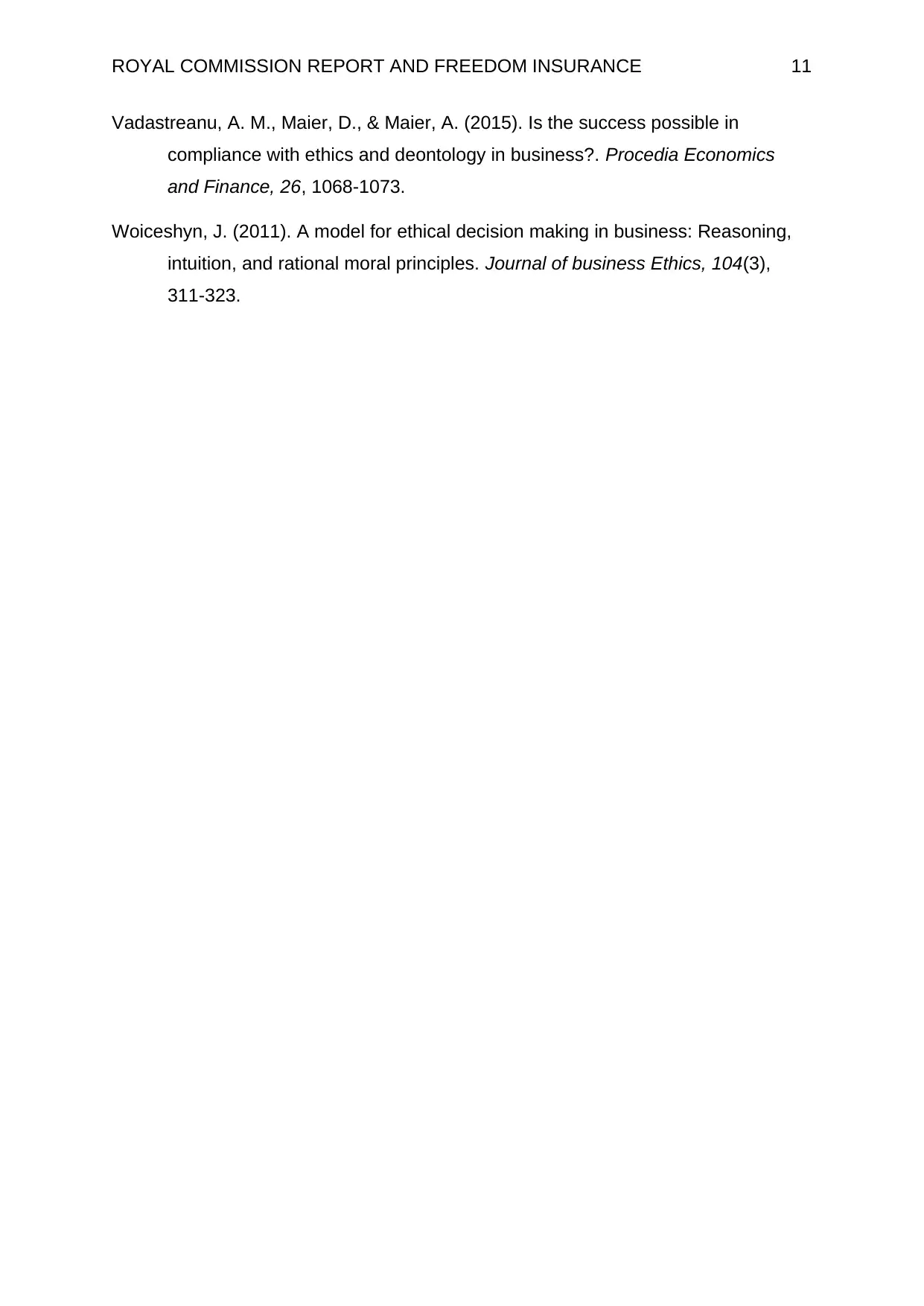
ROYAL COMMISSION REPORT AND FREEDOM INSURANCE 11
Vadastreanu, A. M., Maier, D., & Maier, A. (2015). Is the success possible in
compliance with ethics and deontology in business?. Procedia Economics
and Finance, 26, 1068-1073.
Woiceshyn, J. (2011). A model for ethical decision making in business: Reasoning,
intuition, and rational moral principles. Journal of business Ethics, 104(3),
311-323.
Vadastreanu, A. M., Maier, D., & Maier, A. (2015). Is the success possible in
compliance with ethics and deontology in business?. Procedia Economics
and Finance, 26, 1068-1073.
Woiceshyn, J. (2011). A model for ethical decision making in business: Reasoning,
intuition, and rational moral principles. Journal of business Ethics, 104(3),
311-323.
⊘ This is a preview!⊘
Do you want full access?
Subscribe today to unlock all pages.

Trusted by 1+ million students worldwide
1 out of 12
Related Documents
Your All-in-One AI-Powered Toolkit for Academic Success.
+13062052269
info@desklib.com
Available 24*7 on WhatsApp / Email
![[object Object]](/_next/static/media/star-bottom.7253800d.svg)
Unlock your academic potential
Copyright © 2020–2026 A2Z Services. All Rights Reserved. Developed and managed by ZUCOL.





